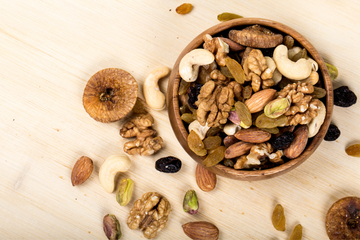Cracking the Nutritional Code: Discovering the Best Time to Indulge in Dry Fruits!
by Bsocial Consultant on Jun 17, 2023

Dry fruits and nuts are not only delicious but also packed with essential nutrients that promote overall health and well-being. From weight management to muscle building, these power-packed snacks offer a range of benefits. But have you ever wondered about the best time to consume dry fruits and nuts for maximum advantage? In this article, we will decode the nutritional code and explore the optimal timing to indulge in these nutritious treats.
Best Time to Eat Dry Fruits and Nuts
1. Morning: A Nutrient-Packed Start to Your Day
Mornings are the ideal time to kick-start your day with a handful of dry fruits and nuts. They provide a burst of energy, thanks to their high fiber, protein, and healthy fat content. The best nuts to eat in the morning include almonds, walnuts, and cashews. These nuts are rich in antioxidants, vitamins, and minerals that support brain function, enhance cognitive abilities, and improve focus throughout the day.
2. After Workout: Fueling Muscle Growth and Recovery
If you're looking to build muscle or engage in intense physical activity, consuming dry fruits and nuts after a workout can be highly beneficial. Nuts like almonds, pistachios, and hazelnuts are excellent sources of protein, which aids in muscle repair and growth. Additionally, they provide essential amino acids, such as L-arginine, which promotes blood flow and oxygen delivery to the muscles, enhancing their recovery process.
3. Evening: A Healthy Snack to Curb Hunger Pangs
The evening hours often bring about hunger pangs and cravings for unhealthy snacks. To avoid giving in to temptation, reach for a handful of dry fruits and nuts. They are a great alternative to processed snacks, as they provide a feeling of fullness due to their fiber content. Moreover, dry fruits like dates, figs, and apricots offer natural sweetness, satisfying your sweet tooth without resorting to sugary treats.
4. Before Bed: Nuts for a Restful Sleep
Consuming a small portion of nuts before bedtime can contribute to a good night's sleep. Almonds and walnuts, in particular, contain melatonin, a hormone that regulates sleep and wake cycles. The magnesium present in these nuts also promotes muscle relaxation, ensuring a peaceful and restorative sleep.
Ayurvedic Insights: Best Time to Eat Nuts According to Ayurveda
In Ayurveda, the traditional system of medicine in India, the timing of meals is of great importance. Ayurvedic principles suggest that consuming nuts during the day, especially in the morning or afternoon, supports digestion and assimilation of nutrients. This aligns with the concept that our digestive fire, known as Agni, is strongest during these periods. Hence, Ayurveda recommends incorporating nuts into your mid-morning or mid-afternoon snack routine for optimal digestion and absorption.
The Best Time to Eat Nuts for Specific Goals
- Weight Loss: If your goal is weight loss, the best time to eat nuts is in the morning or before a workout. Nuts provide satiety and energy, reducing the likelihood of overeating later in the day.
- Weight Gain: To gain weight, consuming nuts as a snack between meals or before bed can be beneficial. They offer a calorie-dense source of healthy fats and proteins, supporting weight gain in a nutritious manner.
- Muscle Building: For muscle building, consuming nuts after a workout or as a part of your post-workout meal is ideal. The protein and amino acids present in nuts aid in muscle repair and growth.
The Bottom Line
Incorporating dry fruits and nuts into your daily diet can have a positive impact on your health. Whether you're aiming for weight loss, weight gain, or muscle building, understanding the best time to eat dry fruits and nuts can optimize their benefits. Starting your day with a handful of dry fruits and nuts provides a nutrient-packed boost, while consuming them after a workout fuels muscle growth and recovery. In the evening, they make a healthy snack to curb hunger pangs, and before bed, they contribute to a restful sleep.
Ayurveda, the traditional system of medicine in India, also emphasizes the timing of meals. According to Ayurvedic principles, consuming nuts during the day, especially in the morning or afternoon, supports digestion and nutrient absorption. Aligning with the concept of Agni, our digestive fire being strongest during these periods, Ayurveda recommends incorporating nuts into your mid-morning or mid-afternoon snack routine for optimal digestion and assimilation.
Additionally, the best time to eat nuts depends on your specific goals. If you're aiming for weight loss, consuming nuts in the morning or before a workout can help provide satiety and energy, reducing the likelihood of overeating later in the day. On the other hand, if your goal is weight gain, including nuts as a snack between meals or before bed can offer a calorie-dense source of healthy fats and proteins, supporting weight gain in a nutritious manner. For muscle building, incorporating nuts after a workout or as a part of your post-workout meal is ideal, as the protein and amino acids present in nuts aid in muscle repair and growth.
To reap the maximum benefits, it's important to incorporate a variety of dry fruits and nuts into your diet. Almonds, walnuts, cashews, pistachios, hazelnuts, dates, figs, and apricots are just a few examples of the diverse options available. Whether you prefer to snack on them as they are or include them in your meals, the key is to enjoy them in moderation and pay attention to portion sizes, as they are calorie-dense.
In conclusion, dry fruits and nuts are nutritional powerhouses that can enhance your overall well-being. By understanding the best time to consume them and aligning them with your specific goals, you can unlock their full potential. So go ahead and crack the nutritional code by incorporating dry fruits and nuts into your daily routine for a healthier and more fulfilling lifestyle with the help of Healthy Master.







